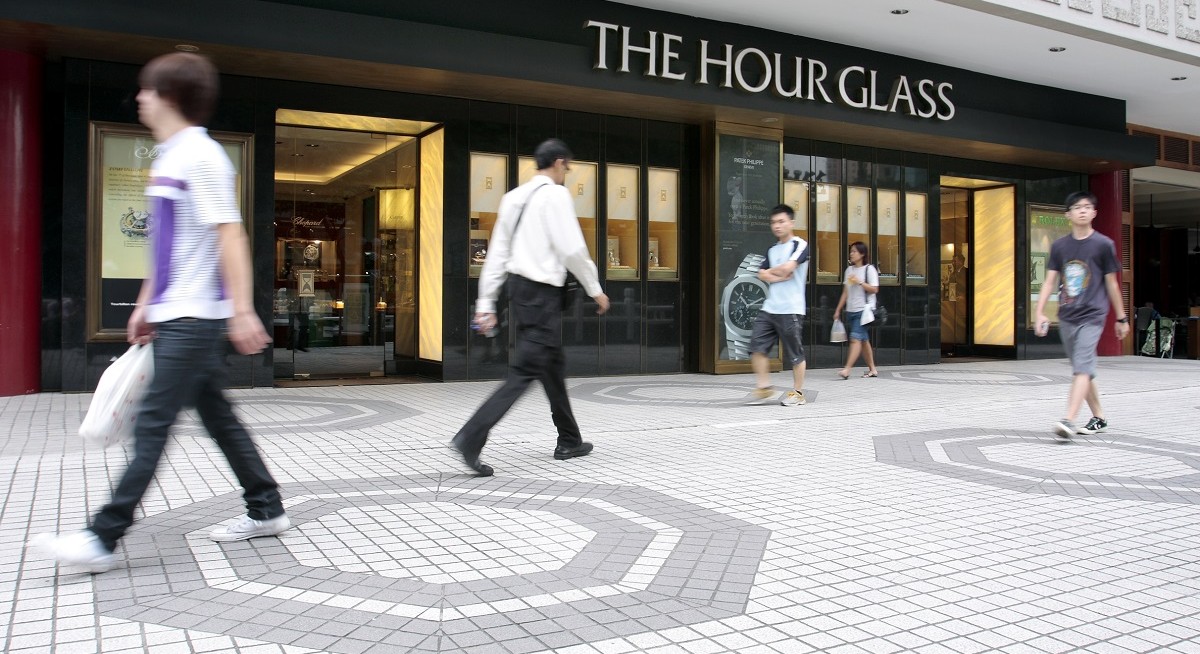BILLION DOLLAR CLUB: CYCLICAL CONSUMER SERVICES + RETAILERS
Back in early 2020, practically every investor was bracing for the economic upheaval brought about by the pandemic.
As it turns out, a few specific industries did particularly well instead. Besides the tech and communications industries, which supported the need for remote working, the luxury market that includes high-end timepieces did well too. Evidently, consumers, with more disposable income to spare because of travel restrictions, chose to indulge in luxury timepieces instead.
Riding on this growth in demand throughout the pandemic years, The Hour Glass, a leading Singapore-listed watch boutique, emerged as the overall sector winner of the industry sector of cyclical consumer services and retailers. It topped for return to shareholders, growth in PAT, weighted ROE as well, marking a rare clean sweep in the Billion Dollar Club category.
The company’s ROE over the three years was 12.95%, profit after tax grew at 18.3% CAGR while reporting a whopping 51.9% CAGR for returns to shareholders.
The Hour Glass has, over the years, grown into a network of 50 boutiques across Asia Pacific, carrying brands including Rolex, Patek Philippe, Audemars Piguet, Hublot, F.P.Journe, Breguet, Cartier, Girard-Perregaux, Omega, Panerai, TAG Heuer and Tudor.
In FY2022 ended March 31, the company reported earnings of $157 million, up 86% y-o-y, on the back of a 39% y-o-y increase in sales to $1.03 billion, thanks partly to “flourishing interest in mechanical watches”. In FY2022, The Hour Glass bought back $34.1 million worth of shares and “remain on an opportunistic footing” for more buybacks. In addition, it has declared a dividend of 8 cents for the year, translating into a total payout of $54.5 million.
As at March 31, The Hour Glass’s cash and bank balances were at $323.4 million. After taking into account loans of some $111 million taken to buy property, the company was in a net cash position of $212.4 million.
“My long-term business partners, including several who have been involved in the trade since before the Quartz Crisis of the 1970s, describe the current period as the biggest expansionary phase they have witnessed occurring in this industry. I concur,” says executive chairman Henry Tay Yun Chwan in the company’s FY2021 annual report.
“Demand for high-end watches is so voracious that supply cannot keep up, while low end watches are being decimated by connected watches,” adds Tay, referring to what he calls a “spectacular boom” in this market.
For example, aggregate demand for a “prestige” brand carried by The Hour Glass was 3.2 times its annual allocation in 2019. It increased to seven times in 2021 and went up further to 12.6 times, annualised, in the middle of 2021, as rising prices in the secondary market pulled in more demand.
However, Tay is not carried away by the outperformance. He notes that the broader economic outlook has “clouded”, with “runaway inflation” and “aggressive” rate hikes. “Barring any major, unexpected events, we believe the scenario with the highest probability is moderated but still growth. We believe that the prudent expansion plans advocated by our key partners is the way to sustainable growth,” he adds.
CENTURION CLUB:
CYCLICAL CONSUMER PRODUCTS AND SERVICES + PERSONAL AND HOUSE PRODUCTS AND SERVICES + RETAILERS
Cortina rides industry-wide boom to top spot
Cortina, under the Lim family, now runs more than 40 stores in markets around the world / Photo: Cortina
While The Hour Glass came out tops in the Billion Dollar Club, another watch boutique, Cortina Holdings earned the top spot in the Centurion Club for the same industry sector. In the previous edition of these awards, Cortina was the overall sector winner and also came out tops for best returns to shareholders.
Cortina, founded by executive chairman Anthony Lim Keen Ban half a century ago, now runs more than 40 stores in markets including Singapore, Malaysia, Thailand, Indonesia, Taiwan, Hong Kong and Australia.
Similar to The Hour Glass, Cortina rode the industry-wide boom. In FY2022 ended March 31, Cortina reported earnings of $73.8 million, up 71.7% y-o-y. Revenue in the same period was up 64.1% over the same period to $716.9 million. Cortina attributes the bigger growth in earnings to “good stock management” and better margins, which reached 32.9% for FY2022 versus 29.1% in FY2021. In FY2022, Cortina declared a record dividend of 12 cents, which includes 5 cents each in the form of a special dividend and a special 50th-anniversary dividend.
“We remain confident that our robust balance sheet and strong cash position stand us in good stead to guard against external events. Meanwhile, our prudent capital management provides us with the financial flexibility and leverage to capitalise on strategic opportunities for future growth,” says Lim.
Elsewhere within the Centurion Club, The Place Holdings won best returns to shareholders with 58.1% CAGR over the three years; ValueMax Group was named for best growth in PAT with its 26.9% CAGR and Kimly won best weighted ROE with 28.44% CAGR over the three years.
The Place Holdings claims to operate three “core business pillars”. These are cultural tourism, property and integrated media. It is backed by the key management team of China-based The Place Investment Group, a multi-billion Chinese conglomerate that has a strong track record for its extensive business portfolio in tourism, media, property management, biomedical technology investments and international trade.
ValueMax Group, a homegrown brand name set up in 1988, was the first pawnbroking chain to be listed on the Mainboard in 2013. It now operates more than 40 pawnbroking and retail outlets in Singapore and another 21 in Malaysia through its associates. Besides pawnbroking, ValueMax is in the businesses of money-lending, retailing of jewellery and watches, and also buying and selling gold.
Kimly is a household brand name with its chain of coffee shops that makes it a rather resilient business given the consumer staples market it serves. From the first outlet in Yishun back in 1990, it has expanded the number of coffee shops and food courts it operates to 85 under various brands.



